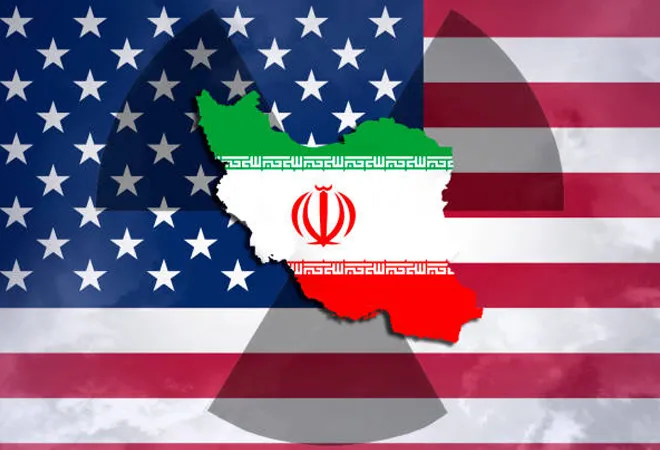
Nuclear deal talks between the United States (US) and Iran ended without a breakthrough in sight in June 2022. The discussions between the two, facilitated by the European Union (EU), took place over two days and were aimed at reviving a diplomatic solution to the tensions that have arisen as a result of the Trump administration’s
unilateral pull out of the Joint Comprehensive Plan of Action (JCPOA) in 2018, which includes France, Germany, the United Kingdom, Russia, and China. The US decision to abandon the accord was followed by heavy sanctions imposed on Iran which further heightened tensions and worries for the stakeholders on the future of the deal. After Washington pulled out of the agreement, Iran stepped up uranium enrichment capacity, but has maintained that its nuclear ambitions remain peaceful. The Trump administration had stated that it would bring Iran under the purview of a “better” nuclear deal, which it failed to do during its term.
The US decision to abandon the accord was followed by heavy sanctions imposed on Iran which further heightened tensions and worries for the stakeholders on the future of the deal.
The
JCPOA, in essence, was an agreement between Iran and the aforementioned P5 nations with the EU, that curbed Iran’s nuclear programme and allowed for extensive international inspections of its nuclear facilities and compliance with requirements mandated by the JCPOA in exchange for lifting sanctions placed on Iran. The impact of the US decision to abandon the accord has resulted in stalled negotiations and concerns amongst other stakeholders of the JCPOA regarding how to continue international monitoring of Iran’s nuclear programmes as well as curb motivations to develop nuclear weapons that may have arisen.
Key impediments
There have been several attempts to coordinate and finalise negotiations between Washington and Tehran over the 2015 nuclear deal. However, there seems to be no progress. Discussions between the other signatories of the deal and Iran have been in motion since April 2021 but have failed to achieve consensus. Earlier negotiations in Vienna and the more recent indirect talks in Qatar have not resulted in a solution as there are several impediments. The US’
designation of Iran’s Islamic Revolutionary Guard Corps (IRGC) as a “foreign terrorist organisation” has been a key issue for Iran. Iran has pushed for the group to be removed from the US’ blacklist of foreign terrorists’ organisations”, however, Washington has remained unwilling to do so. Another impediment to the accord has been Israel, a staunch opponent of the 2015 nuclear deal, wanting
more pressure on Iran.
The US and the European allies had submitted reports to the IAEA expressing concern about Iran’s nuclear intentions as well as the lack of cooperation from Tehran’s side.
The unlikelihood of success in negotiations between the US and Iran is exacerbated by hostilities between both parties. Earlier in June, Iran
took down several cameras installed by the international nuclear watchdog, the International Atomic Energy Agency (IAEA), in response to a resolution that sought to
censure Iran over its nuclear programme. The US and the European allies had submitted reports to the IAEA expressing concern about Iran’s nuclear intentions as well as the lack of cooperation from Tehran’s side. Iran’s move makes it harder for the IAEA to track activity at Iran’s nuclear facilities. However, Iran has stated that it has not taken any measure that goes against its compliance requirements with the IAEA. More recently, earlier this week in July, the Biden administration
announced a new round of sanctions which impacted Iran and individuals and entities in Iran involved in the sale of “US-sanctioned Iranian petroleum and petrochemical products to East Asia”. The commitment to revive the JCPOA was a key tenet of President Joe Biden’s presidential campaign. However, Iran’s activities have not helped and the Biden administration has continued to impose
new sanctions on Iran as well as enforced Trump’s sanctions.
Why is the Iran nuclear deal important?
The JCPOA is a landmark accord that puts limitations on Iran’s nuclear programme and paved the way for 24-hour surveillance by the IAEA of the country’s nuclear facilities. Additionally, the deal was said to hold the potential of strengthening Iran’s economy. The deal also incentivised Iran’s compliance and encouraged accountability amongst nuclear powers without the use of crippling policy measures such as economic sanctions. The potential success of negotiations would have signalled for a return of Iranian oil into the global market as demands increased following Russia’s invasion of Ukraine.
The painstaking negotiations required to reach an agreement in 2015 as well as the inability to arrive at a deal in the talks post-US’ pull out of the deal point towards further failures in reaching a deal that suits the vested interests of all stakeholders.
What does this mean for the future?
Although the talks in Qatar concluded with no resolution, the US and Iran agreed to continue discussions. This was facilitated by EU’s Foreign Policy Chief, Josep Borrell’s visit to Tehran. It has been reiterated by several key stakeholders including both the US and Iran, that a return to the nuclear deal would be ideal and in the best interest of all parties involved. However, the painstaking negotiations required to reach an agreement in 2015 as well as the inability to arrive at a deal in the talks post-US’ pull out of the deal point towards further failures in reaching a deal that suits the vested interests of all stakeholders. The issue of sanctions has and will continue to play a central role in the likelihood of the nuclear deal’s revival. For the US, imposing sanctions has not worked in the case of the demands of a nuclear deal with Iran. Even though the willingness of both parties to engage in discussions is a good sign that the revival of the deal is not entirely impossible, it is important to acknowledge that without the extension of an ‘olive branch’ by any of the stakeholders, the likelihood of success remains minimal. As the US pushes for more sanctions, the potential for Iran to move away from compliance with the JCPOA guidelines increases. To return to consensus in the Iran nuclear deal for all parties, the negotiations must establish a common ground to incentivise both US participation and Iran compliance.
In the case of any agreement, each party’s primary goal is to ensure the protection and accomplishment of one’s own vested interest. However, in the case of the global nuclear order, the key goal remains to push for nuclear disarmament and move states away from pursuing nuclear weapons. With political aggressions such as an increasingly nuclear-aggressive North Korea as well as Russia’s invasion of Ukraine, the need for global disarmament is only amplified. As we go on longer without a resolution between Washington and Tehran, the demise of the JCPOA comes closer to becoming a reality.
The views expressed above belong to the author(s). ORF research and analyses now available on Telegram! Click here to access our curated content — blogs, longforms and interviews.



 Nuclear deal talks between the United States (US) and Iran ended without a breakthrough in sight in June 2022. The discussions between the two, facilitated by the European Union (EU), took place over two days and were aimed at reviving a diplomatic solution to the tensions that have arisen as a result of the Trump administration’s
Nuclear deal talks between the United States (US) and Iran ended without a breakthrough in sight in June 2022. The discussions between the two, facilitated by the European Union (EU), took place over two days and were aimed at reviving a diplomatic solution to the tensions that have arisen as a result of the Trump administration’s  PREV
PREV


